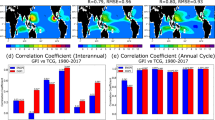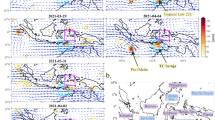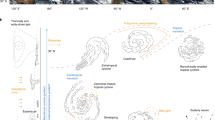Abstract
THERE can be no doubt, I suppose, that solar and terrestrial radiation are ultimately responsible for the kinetic energy of the winds. The doubts expressed by Mr. R. M. Deeley in NATURE of November 11 and by Mr. W. H. Dines in the issue of November 18 can refer only to the details of the phenomena consequent on the process of transformation of the energy. The first stage is obviously the storage of energy in the potential form of air charged with heat and moisture at the surface or lower levels and cooled by radiation at high levels, especially in the polar regions, as on the plateau of Greenland or on that of the Antarctic continent, or on the sunless slopes of the Himalaya. Equally without doubt the next step is convection, the greater part of which is indicated here and there by falling rain or snow. Measurements of rainfall assure us that there is no lack of energy available for violent winds if the heat-engine is at all efficient.
This is a preview of subscription content, access via your institution
Access options
Subscribe to this journal
Receive 51 print issues and online access
$199.00 per year
only $3.90 per issue
Buy this article
- Purchase on Springer Link
- Instant access to full article PDF
Prices may be subject to local taxes which are calculated during checkout
Similar content being viewed by others
Author information
Authors and Affiliations
Rights and permissions
About this article
Cite this article
SHAW, N. The Energy of Cyclones. Nature 106, 436–437 (1920). https://doi.org/10.1038/106436c0
Issue Date:
DOI: https://doi.org/10.1038/106436c0
Comments
By submitting a comment you agree to abide by our Terms and Community Guidelines. If you find something abusive or that does not comply with our terms or guidelines please flag it as inappropriate.



